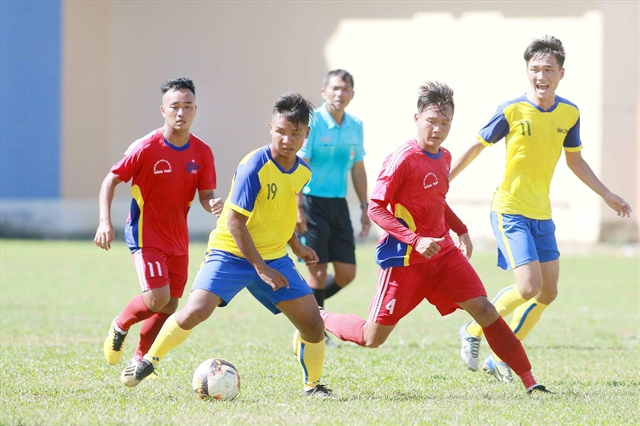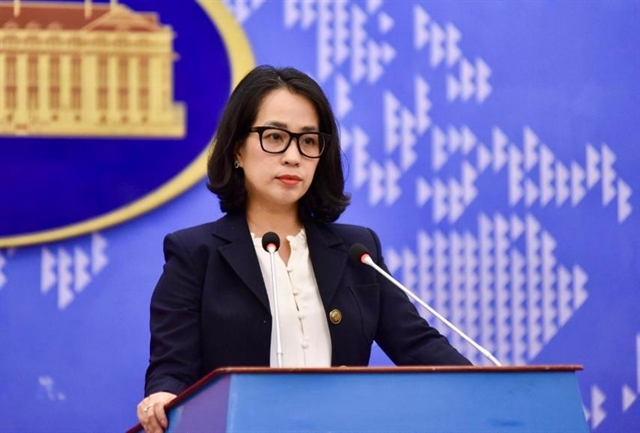 Sports
Sports

Eleven players of Đồng Tháp were involved in the affair which saw Đồng Tháp draw Vĩnh Long 1-1 in a group round match. They shared VNĐ133 million (US$5,700) after the game for keeping the total score at two goals or less.

|
| Huỳnh Văn Tiến (No 11) seen competing for Đồng Tháp in the National U21 Football Championship in 2019. He was determined to have led a match-fixing ring. — Photo laodong.vn |
Football
HÀ NỘI — Huỳnh Văn Tiến's football career could be over at the tender age of 21.
The Đồng Tháp Province-born player has been banned from all national football activities for five years after he was identified as the leader of a match-fixing ring in the 2019 National U21 Championship.
Eleven players of Đồng Tháp were involved in the affair which saw Đồng Tháp draw Vĩnh Long 1-1 in a group round match. They shared VNĐ133 million (US$5,700) after the game for keeping the total score at two goals or less.
“It is nearly the end of his time with football. It will be difficult to compete again when he comes back at 26,” said Vũ Xuân Thành, head of the Việt Nam Football Federation’s Discipline Department.
The 10 players who Tiến admitted he enticed to get involved were banned for six months.
“They should be reeducated so they will recognise their wrongdoing. Some of them are still naïve as they do not think their activity was a kind of crime,” said Thành.
The affair raised concerns in football about young players’ education.
Coach Hoàng Anh Tuấn recently revealed out of control players was the main reason he resigned after title candidate Việt Nam lost at the 2019 ASEAN U18 Championship.
The coach, who guided Việt Nam to 2017 U20 World Cup, said he could not control his players who had no awareness of professionalism or discipline. At least, nine players broke team rules during the tournament, and he could not do anything to change them because of the short time that they were under his watch.
After four years working in Việt Nam, Jurgen Gede, national team technical director who is set to leave his post at the end of June, understands the problem.
The German said some of them knew the rules but still had drinks and food which were not good for athletes. Some youngsters even smoked.
In March, the VFF fined players of Đắk Lắk and Bình Định for a similar incident in the 2020 National U19 Championship’s group round match.
Education, strict bans needed
Reacting to the match-fixing scandal, local football pundits have appealed for more attention on players’ education, the responsibilities of coaches and heavier sanctions for bringing the game into disrepute.
Deputy head of the VFF’s Discipline Department Phan Anh Tú said the VFF applied the heaviest ban to them because they wanted to make sure the young players recognise their mistakes and don't make them again.
“We are doing fair-play and ‘clean’ football so the ban should be strict,” said Tú.
Former coach Lê Thụy Hải said he wanted to give life bans for match-fixing.
“We should not let them return to football, even playing in amateur tournaments. I believe that heavy sanctions would make others afraid of wrongdoing. Everything has been developing well, do not let one rotten apple spoil the barrel,” said Hải, adding that the bans for the Dong Thap players weren't tough enough to warn other youngsters.
At the same time, the role of coaches has come under discussion.
“Children at around 10-11 are recruited to train and live in training centres under their coaches’ management. Therefore, coaches have a strong influence on them as they are side by side with their players during training and life for years. They must take care of both the profession and morality of players,” said coach Lưu Ngọc Hùng.
“At the age of 18-19, players are still innocent. They are easily tempted by cash if they are not educated well. If there is a fine for a player, his coach should be fined too. It is to make them more responsible for those they have trained,” he said.
Coach Nguyễn Thành Vinh said coaches had responsibility for their players’ education.
“In some centres, coaches now just manage players in training. They do not care much about educating players’ morality. After training, they do not know where athletes go and what they do,” said Vinh.
“Some coaches even lead uncontrolled lives and drink in front of players. How can this kind of coach make good players?
“In my opinion, coaches should be a mirror for all. They must be knowledgeable, serious and sharing. I mean, a coach should be good in both virtue and profession.”
Meanwhile, football expert Đoàn Minh Xương said: “Match-fixing or betting have existed for a long time. We need a solution to fight these problems.”
Xương said it’d better to develop football from the community and schools. Players should train at centres and return home after classes.
“If we only make them players while ignoring teaching them to be good people, we won't be able to stop these problems in football,” said Xương. — VNS




